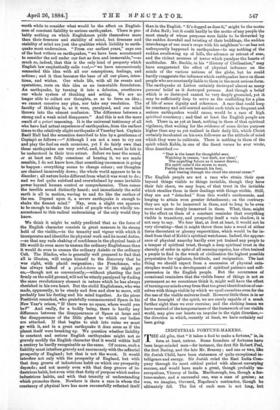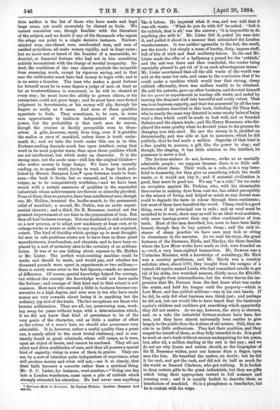INDUSTRIAL FORTUNE-MAKERS.
THE old gibe, that " it takes a fool to make a fortune," is, in form at least, untrue. Some founders of fortunes have been large-minded men—for instance, the first Sir Robert Peel, the first Baring, and the late Mr. Brassey ; and one or two, like Sir Josiah Child, have been statesmen of quite exceptional in- telligence and energy. Sir Josiah ruled the East India Com- pany through its most critical period with almost unvarying success, and would have made a great, though probably un- scrupulous, Viceroy of India. Marlborough, too, though a for- tune-maker, and a successful one, was a man of genius ; as was, we imagine, Ouvrard, Napoleon's contractor, though he ultimately fell. The list of such men is not long, but then neither is the list of those who have made and kept large sums, yet could accurately be classed as fools. We cannot remember one, though familiar with the literature of the subject, and we doubt if any of the thousands who repeat the adage can point to a single decisive instance. Narrow- minded men, one-ideaed men, uneducated men, and men of ossified prejudices, all make money rapidly, and in huge sums ; but we never met or heard of the founder of a mercantile, in- dustrial, or financial fortune who had not in him something entirely inconsistent with the charge of mental incapacity. In- deed, the conditions of the case almost preclude the incapable from amassing much, except by rigorous saving, and in that case the millionaire must have had money to begin with, and is in no sense a founder. The man who makes a great fortune for himself must be in some degree a judge of men, at least as far as trustworthiness is concerned, or he will be cheated at every step ; he must have the ability to govern others, or his enterprises could not grow large ; and he must have sure-footed judgment in investments, or his money will slip through his fingers as easily as it came. And none of these qualities appertain to fools. They sometimes, to be sure, in some men approximate to instincts independent of reasoning power, but the probability is that such men do reason, though the process is hardly perceptible even to them- selves. A gibe, however, rarely lives long, even if it gratifies the malice or envy of mankind, unless there is truth under- neath it ; and we take the truth under this one to be this. Fortune-making depends much less upon intellect, using that word in its most popular sense, than upon those qualities which are not intellectual, but which make up character. It is the strong man, not the acute man—still less the original thinker— who makes money in large lumps. We have been recently reading, or, to speak truth, trying to read, a huge book pub- lished by Messrs. Sampson Low,* upon fortunes made in busi- ness,—the book is lively, but so unequal, and in chapters so vulgar, as to be comparatively worthless,—and we have been struck with a certain sameness of qualities in the successful industrials whose achievements are therein so absurdly glorified. None of them, that we perceive, have been intellectual men, though one, Mr. Holden, invented the lucifer-match, to the permanent relief of mankind ; a second, Mr. Perkin, was an acute experi- mental chemist ; and a third, Sir H. Bessemer, worked out the greatest improvement of our time in the preparation of iron. But they all had business courage. Not one hesitated to risk a fortune on a new process, or to adopt new machinery at huge cost, or to enlarge works or mines or mills to any required, or not required, extent. The kind of timidity which springs up in most thought- ful men in safe positions seems not to have been in these great manufacturers, ironfounders, and chemists, and to have been re- placed by a sort of certainty akin to the certainty of an arithme- tician. It was of no use talking about expense to Mr. Holden or Mr. Lister. The perfect wool-combing machine could be made, and should be made, and would pay, and whether ten thousand pounds were spent in experiments or two millions,— there is surely some error in the last figures,—made no manner of difference. Of course, special knowledge helped the courage, but without the courage the knowledge would not have made the fortune ; and courage of that kind and to that extent is not common. Most men who succeed a little in business become con- servative to a high degree, and nine men in ten who have made money are very cowards about losing it in anything but the ordinary jog-trot of the trade. The few exceptions are those who become millionaires. They are all, too, persevering men, work- ing away for years without hope, with a determination which, if we did not know that kind of persistence to be of the very grain of the character, and as little a matter of effort as the colour of a man's hair, we should also pronounce very admirable. It is, however, rather a useful quality than a great one, is nearly allied to the most brutal obstinacy, and is con- stantly found in great criminals, whose will snaps, as it were, upon an object of desire, and cannot be unclosed. They all can select and drive multitudes of men, and they all possess a special kind of sagacity, rising in some of them to genius. They can see, by a sort of intuition quite independent of experience, what will produce money and what will not,—see it so clearly, that their faith becomes a concrete rather than a spiritual thing. Mr. S. C. Lister, for instance, wool-comber,—" Going one day into a London warehouse, came upon a pile of rubbish which strongly attracted his attention. He had never seen anything a • Fortunes Made in Business. By Various Writers. London: Sampson Low nd tunes Made it before. He inquired what it was, and was told that it was silk waste. What do you do with it ?' he asked. Sell it for rubbish, that is all,' was the answer ; it is impossible to do anything else with it.' Mr. Lister felt it, poked his nose into it, and pulled it about in a manner that astonished the London warehousemen. It was neither agreeable to the feel, the smell, nor the touch ; but simply a mass of knotty, dirty, impure stuff, full of bits of stick and dead mulberry-leaves. In the end Mr. Lister made the offer of a halfpenny a pound for the rubbish,' and the sale was there and then concluded, the vendor being especially pleased to get rid of it on such advantageous terms.' Mr. Lister ascertained that all the silk waste of the world was sold at the same low rate, and came to the conclusion that if he could make a machine which would tear that strong, cheap rubbish effectually, there was endless wealth to be obtained. He sold his patents, gave up other business, and devoted himself for ten years to experiments in tearing silk waste, and ended by turning the despised stuff into beautiful and costly velvet. That was true business sagacity, and that was possessed by all the true fortune-makers described in this book, including Sir Titus Salt, who in nearly the same way detected in some musty bales of hairy wool a fibre which could be made to look well, and so founded Saltaire and the alpaca trade ; and Sir Henry Bessemer, who dis- played the same quality when he devoted years to his process for changing iron into steel. He saw the money in it, plodded on determinedly, and was able at last to announce, which he did publicly, that he had made a million. Sagacity of that kind is a fine quality to possess, a gift like the power to sing ; and though, like singing, it has little relation to the intellect, its possessor is never a fool.
The fortune-makers do not, however, strike us as specially admirable people ; we suppose because there is so little self- sacrifice about them. Their work, as a rule, is in a way bene- ficial to humanity, for they give us something which the world wants, or it would not buy it ; and if material civilisation is good, that must be good too. We say " as a rule," for we make an exception against Mr. Perkins, who, with his abominable discoveries in making dyes from coal-tar, has added perceptibly to the misery of living, and helped as much as any decent man could to degrade the taste in colour through three continents ; but most of them have benefited the world. Cheap steel is a good thing, even if its principal use is rails ; and as wool must be Beached to be worn, there may as well be an ideal wool-scutcher, with more tearing-power than any other combination of iron teeth. Most of the men described, too, seem to have been fairly honest, though they do buy patents cheap ; and the only in- stance of sharp practice we have seen may look so owing to clumsiness in the narrator. As we read his story, the great fortunes of the Dawsons, Hirds, and Hardys, the three families whom the Low Moor works have made so rich, were founded on a,—well, a very keen-sighted transaction. Mr. Dawson was a Unitarian Minister, with a knowledge of metallurgy, Mr. Hird was a country gentleman, and Mr. Hardy was a country solicitor, when, about 1790, they bought from the assigns of a ruined old squire, named Leeds, who had committed suicide to get rid of his debts, two wretched manors, chiefly moor, for £34,000. They bought from intermediaries, but the writer leaves the im- pression that Mr. Dawson from the first knew what was under the estate, and held his tongue until the property—which is Low Moor, and has yielded millions—was in his own hands. If he did, he only did what business men think just ; and perhaps he did not, but one would like to have heard that the bankrupt squire's children and creditors got something which apparently they did not receive. As we say, however, the story is obscure, and, as a rule, the industrial fortune-makers have been fair men, and they have almost universally been readier to give largely to the public than the holders of old estates. Still, they ex- cite in us little enthusiasm. They had their qualities, and they reaped the benefit of them, as they fully intended to do. It is good to work at one's trade without success undespairing for ten years, but, after all, a million sterling at the end is fair pay ; and we do not see why Queen and nation should, as the biographer of Sir H. Bessemer wishes, pour out honour from a flagon upon men like him. He benefited the nation, no doubt ; but he did it for cash, and got the cash, and did not do half as much for the world as Samuel Clarkson, who got nothing. It is foolish to deny certain gifts to the great industrials, but they are gifts which bring their appropriate reward in full measure and running over ; and it is equally foolish to describe them as benefactors of mankind. So is a ploughman a benefactor, but he is content with his wage.



































 Previous page
Previous page